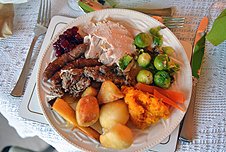Feifei: This is a great restaurant, Finn. I'm glad we could finally come here and try out their new menu.
菲菲:芬恩,這真是家很棒的餐廳。我很高興我們終于可以來這里品嘗他們的新菜式了。
Finn: It is a good restaurant, Feifei. But, well, I haven't been able to relax and enjoy a nice meal in the last few weeks.
芬恩:菲菲,這是家不錯的餐廳。可是,我過去幾周都沒有放松過,也沒有享用過一頓美餐。
Feifei: Really?
菲菲:真的嗎?
Finn: Yes, well, I'm moving home soon...
芬恩:是啊,我馬上就要搬家了……
Feifei: Oh, I know how difficult it is to find a new flat.
菲菲:哦,我知道要找一間新公寓有多難。
Finn: Yes. And my grandmother has been complaining that I don't visit her in Scotland very often...
芬恩:是啊。而且我祖母一直在抱怨我沒有經常去蘇格蘭探望她……
Feifei: Yes, our elders like us to visit every now and again.
菲菲:是啊,我們的長輩希望我們能經常去看望他們。
Finn: And this new project at work...
芬恩:還有工作中的這個新項目……
Feifei: I've noticed that you have been working late...
菲菲:我注意到你最近一直工作到很晚……
Finn: I simply have too much on my plate right now!
芬恩:我只是現在有太多的事情要做了!
Feifei: Oh, if you have too much on your plate, can I help you?
菲菲:哦,如果你盤子里有太多東西,我能幫你嗎?
Finn: Yes, well, that would be nice...
芬恩:好啊,那真是太好了……
Feifei: Leave it to me. Let me take some of this lovely looking chicken from you. Mmm... this is very tasty...
菲菲:交給我吧。我來從你的盤子里拿些美味的雞肉。嗯……這真的太好吃了……
Finn: Feifei, what are you doing?! You're taking food from my plate?!
芬恩:菲菲,你在做什么?!你在從我的盤子里拿食物嗎?!
Feifei: Mmm... I must find out how they cook this chicken. It tastes so good!
菲菲:嗯……我一定要知道這些雞肉是怎么做出來的。真的太好吃了!
Finn: Feifei, I didn't mean for you to take food from my plate. In English, when you say you 'have a lot on your plate' or 'too much on your plate', you mean you have a lot of work to do or a lot of problems to deal with.
芬恩:菲菲,我的意思并不是讓你從我的盤子里拿食物。在英語中,have a lot on your plate或者too much on your plate的意思是你有太多的工作要做或是有太多的問題要處理。
Feifei: Problems?! That's not good.
菲菲:問題?!那可不太好。
Finn: Yes. Well, it's not about food, but about work and problems. 'Have a lot on my plate' is today's expression in The English We Speak. Let's hear some examples of how it's used.
芬恩:是啊。這個表達與食物無關,而是和工作和問題有關。Have a lot on my plate就是今天地道英語節目要學的表達方式。我們來聽些例句,看看這個短語如何應用。
Ann has a lot on her plate at the moment. She's just had twins!
安現在有太多的事情要做。她剛剛生了雙胞胎!
Sorry, but the manager can't speak to you today. The company is launching new products next week and she's got too much on her plate right now.
抱歉,可是經理今天不能和您談話。公司將在下周推出新產品,她現在有太多的事情要做了。
Feifei: Oh, so this expression has nothing to do with this delicious food you have on your plate.
菲菲:哦,所以這個表達方式與你盤子里這些美味的食物無關。
Finn: Come on, Feifei. You knew this expression already - you just wanted to pinch my chicken!
芬恩:菲菲,好了。你已經知道這個短語的意思了,你只是想吃我的雞肉!
Feifei: OK, OK, guilty as charged! This chicken looks so appetising... and these potatoes and...
菲菲:好吧,好吧,我承認!這雞肉看上去太可口了……還有這些土豆和……
Finn: Feifei, I can share them with you.
芬恩:菲菲,我可以和你分享這些食物。
Feifei: Oh thank you, Finn. And you can share the workload, too. I can help you with your new project so you'll have time to go and visit your granny.
菲菲:哦,芬恩,謝謝你。你也可以分擔工作量。我會幫你完成新項目的,這樣你就有時間去看望你的奶奶了。
Finn: Feifei, I'm very grateful. Here, have some more potatoes. And... I like the look of that carrot mash you have on your plate.
芬恩:菲菲,我真是太感謝你了。來,再吃點土豆吧。還有……我喜歡你盤子里的胡蘿卜泥。
Feifei: Here, have some... this food is lovely! We'll have clean plates in no time at all. Bye.
菲菲:來,吃一點吧……這些食物真好吃!我們很快就會吃光的。再見。
Finn: Bye.
芬恩:再見。

譯文屬可可原創,僅供學習交流使用,未經許可請勿轉載











